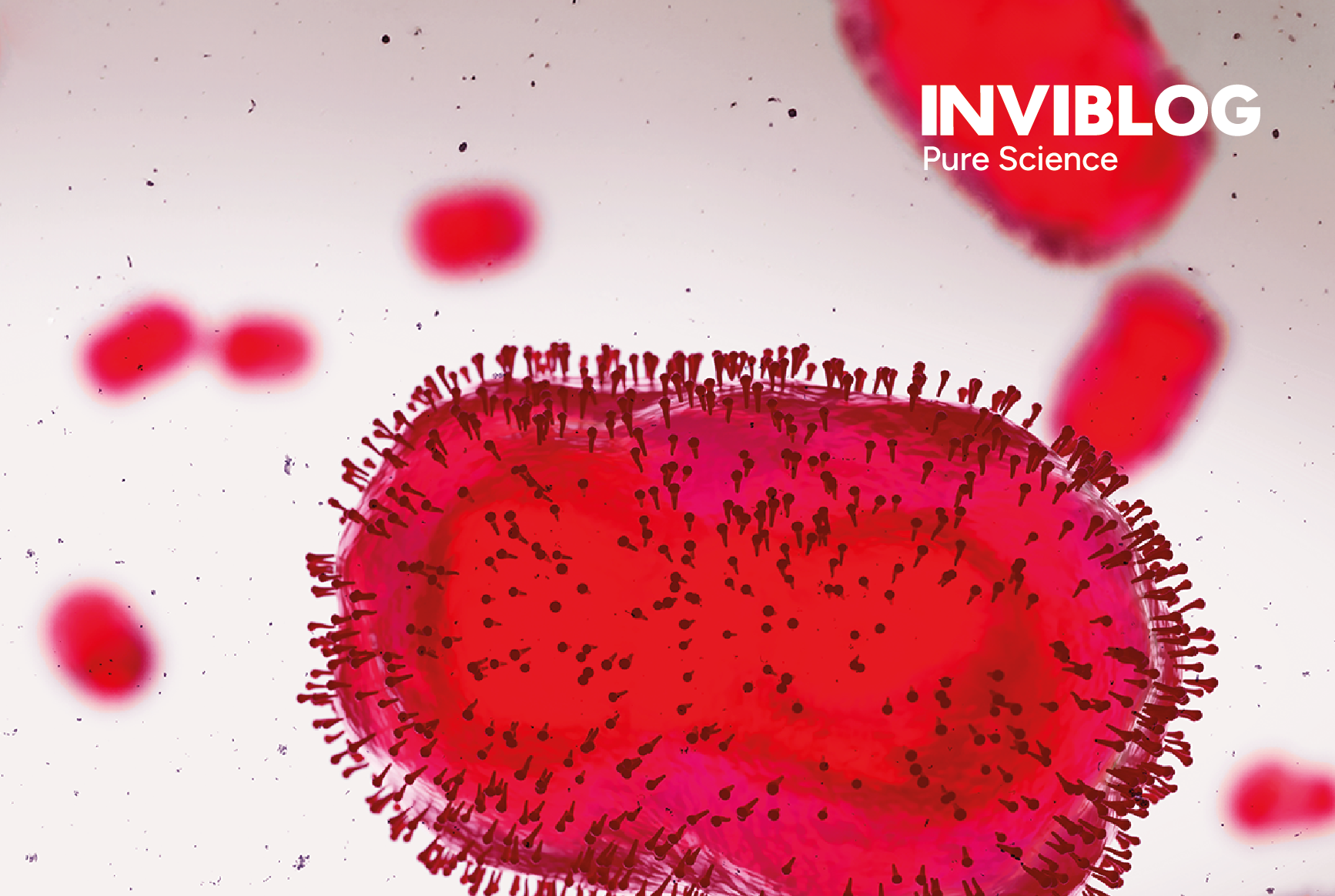Introduction
Chagas disease, also known as American trypanosomiasis, is a potentially life-threatening illness caused by the protozoan parasite Trypanosoma cruzi. According to the World Health Organization estimates, 6 to 7 million people worldwide are infected with the parasite [1]. Especially in Latin America it remains a significant public health challenge.

Figure 1: The parasite Trypanosoma cruzi (see arrows) between red blood cells. Figure from: Aggeu Magalhães Institute/Fiocruz [2]
Beside serological tests, the detection of the parasite can be done by quantitative real-time PCR testing (qPCR), a method generally known for its exceptional sensitivity and specificity. However, the sensitivity of a qPCR is influenced by the choice of the nucleic acid extraction kit used for isolating the DNA from the sample. This blog post discusses the findings from a recent study comparing the performance of different commercial extraction kits in terms of their sensitivity for diagnosing T. cruzi.
Broadening PCR Applications in Chagas Disease Management
The adoption of qPCR for Chagas disease in Latin America marks a significant advancement in diagnostic capabilities. In Brazil and Bolivia, qPCR became increasingly relevant not only for initial diagnosis but also for monitoring treatment efficacy and detecting re-infections [2]. Due to the high sensitivity and specificity compared to traditional serological methods, qPCR testing allows to accurately track the amount of circulating parasites in the blood, which is used to detect a re-activation of the parasite in infected patients [3].
However, the diagnostic value of nucleic acid based procedures like qPCR is highly depending on the presence and availability of target DNA in the sample. Extracting and purifying the nucleic acids from the sample is therefore the key to those diagnostic applications.
The Relevance of Nucleic Acid Extraction for reliable Pathogen Detection
Sensitive nucleic acid extraction methods are crucial for ensuring the accuracy and reliability of subsequent diagnostic procedures like qPCR. It is crucial to ensure that even low quantities of pathogen DNA are efficiently isolated and purified from clinical samples. This is essential for several reasons:
1. Enhanced Detection Sensitivity
Sensitive extraction techniques are designed to maximize the yield of DNA from samples, especially those with low pathogen loads. This is particularly important for detecting infections at early stages or in cases where the pathogen is present in minimal quantities. By isolating even trace amounts of DNA, the nucleic extraction process can significantly improve the sensitivity of downstream applications like qPCR, reducing the likelihood of false-negative results.
2. Accurate Quantification
Accurate quantification of pathogen DNA can be crucial for monitoring disease progression and treatment efficacy. Sensitive extraction methods ensure that the DNA obtained is representative of the actual pathogen load in the sample. This allows for precise quantification in downstream applications, providing valuable data for clinical decision-making and patient management.
3. Improved Diagnostic Accuracy
The goal of any diagnostic test is to provide accurate and timely results. Sensitive DNA extraction methods enhance the overall diagnostic accuracy by ensuring that sufficient DNA is available for detection, even in challenging samples. This leads to more reliable diagnoses, better patient outcomes, and more effective disease management.
Different Extraction Kits may result in different diagnostic sensitivity
The study published by Kann et al. in 2022 evaluated the influence of three different DNA extraction kits on the diagnostic sensitivity of detecting T. cruzi in human samples [4].
Serum samples from 62 patients previously tested positive for T. cruzi [5] were processed using the following nucleic acid extraction kits:
- RTP® Pathogen Kit (Invitek Diagnostics, Germany)
- MagaBio plus Virus DNA/RNA purification kit version 2 (Hangzhou Bioer Technology Co., Ltd, China)
- EZ1&2 Virus Mini Kit v2.0 (Qiagen, Germany)
The extracted nucleic acid eluates were subsequently tested using a T. cruzi-specific qPCR.
The RTP® Pathogen Kit outperformed the other extraction kits in terms of diagnostic sensitivity and total amount of extracted DNA:
Table 1: Comparative results for three different extraction kits. Sensitivity (number of correctly positive detected samples) as well as mean Ct value (lower values indicate a higher DNA concentration) where best for the RTP® Pathogen Kit.
|
Extraction Kit |
RTP® Pathogen Kit |
MagaBio kit |
Qiagen kit |
|
Sensitivity |
62/62 |
61/62 |
60/62 |
|
Mean Ct value |
30.8 |
31.8 |
33.4 |
- Diagnostic sensitivity: Only the RTP® Pathogen Kit correctly positive detected all out of the 62 samples. The MagaBio kit detected 61/62 positive samples while the Qiagen Kit only detected 60/62 positive samples.
- Total DNA amount: The obtained Ct values (lower Ct values are indicating a higher amount of target DNA present in the sample) were significantly different between the different extraction kits The RTP® Pathogen Kit showed the lowest mean Ct value (30.8), indicating a higher concentration of target DNA in the sample compared to the others (Qiagen kit: 31.8, MagaBio kit: 33.4).
The results of the study confirm that the choice of the nucleic acid extraction kit is significantly influencing the downstream detection and the overall diagnostic value the clinical application.
Compatibility of the RTP® Pathogen Kit with downstream applications
Another study was investigating the performance of different commercial Trypanosoma cruzi PCR kits in detecting the parasite DNA [6]. Nucleic acids from a total of 92 serum samples was extracted using the RTP® Pathogen Kit and subsequently analysed with the NDO real-time PCR (TIB MOLBIOL) and the RealStar Chagas PCR Kit 1.0 (altona Diagnostics). Both kits showed comparable sensitivity (97.9% vs. 96.8%) which shows that the RTP® Pathogen Kit shows reliable performance independent of the downstream application.
Over the last years laboratories all over the world have successfully used the RTP® Pathogen Kit for extraction of bacterial and viral nucleic acids from various sample types and downstream applications like qPCR, RT-PCR, Pyrosequencing and Next Generation Sequencing, proving its utility in diverse diagnostic settings [7]. An overview can be found here: RTP White Paper
Conclusion
The findings from the comparative study from Kann et al. [4] underscore the importance of selecting the right nucleic acid extraction kit for PCR testing in Chagas disease. The RTP® Pathogen Kit stands out as the most reliable alternative, offering superior sensitivity and compatibility with other PCR kits. As Latin America continues to advance its diagnostic capabilities, the adoption of robust and reliable diagnostic methods will be crucial in the fight against Chagas disease.
👉 Stay Ahead in Molecular Diagnostics
Subscribe to Invitek’s blog and get expert insights, research updates, and emerging technology trends — straight to your inbox.
REFERENCES
[1] https://www.who.int/health-topics/chagas-disease#tab=tab_1
[2] https://chagas.fiocruz.br/en/disease/diagnosis/
[3] Moreira OC, Ramírez JD, Velázquez E, Melo MF, Lima-Ferreira C, Guhl F, Sosa-Estani S, Marin-Neto JA, Morillo CA, Britto C. Towards the establishment of a consensus real-time qPCR to monitor Trypanosoma cruzi parasitemia in patients with chronic Chagas disease cardiomyopathy: a substudy from the BENEFIT trial. Acta Trop. 2013 Jan;125(1):23-31. doi: 10.1016/j.actatropica.2012.08.020. Epub 2012 Sep 12. PMID: 22982466.
[4] Kann S, Zabala-Monterroza W, García C, Concha G, Landt O, Hahn A, Weinreich F, Frickmann H. Comparison of the Influence of Different Nucleic Acid Extraction Assays on the Sensitivity of Trypanosoma cruzi-Specific Real-Time PCR. Microorganisms. 2022 Jul 31;10(8):1554. doi: 10.3390/microorganisms10081554. PMID: 36013972; PMCID: PMC9414588.
[5] Kann S, Kunz M, Hansen J, Sievertsen J, Crespo JJ, Loperena A, Arriens S, Dandekar T. Chagas Disease: Detection of Trypanosoma cruzi by a New, High-Specific Real Time PCR. J Clin Med. 2020 May 18;9(5):1517. doi: 10.3390/jcm9051517. PMID: 32443464; PMCID: PMC7291166.
[6] Kann S, Concha G, Weinreich F, Hahn A, Rückert C, Kalinowski J, Landt O, Frickmann H. Comparative Assessment of Two Commercial Real-Time PCR Assays for the Diagnosis of Trypanosoma cruzi DNA in Serum. Microorganisms. 2023 Mar 30;11(4):901. doi: 10.3390/microorganisms11040901. PMID: 37110326; PMCID: PMC10142699.
[7] Invitek Diagnostics. RTP Whitepaper.



.png)